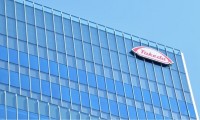-
Azurity Pharmaceuticals Absorbs Slayback Pharma
- Source: drugdu
- 167
- September 29, 2023
-
Takeda settles antitrust lawsuit over gout drug Colcrys after trial kicked off
- Source: drugdu
- 206
- September 25, 2023
-
CDMOs SK pharmteco, Oxford Biomedica make cell and gene therapy manufacturing M&A plays
- Source: drugdu
- 105
- September 22, 2023
-
FDA Approves GSK Myelofibrosis Med That Has Edge Over Others in Drug Class
- Source: drugdu
- 181
- September 19, 2023
-
Coherus acquires immuno-oncology company Surface
- Source: drugdu
- 207
- September 13, 2023
-
analysts
- Source: drugdu
- 118
- September 11, 2023
-
J&J dumps high-dose Opsumit trial upon failure in rare type of pulmonary hypertension
- Source: drugdu
- 103
- September 9, 2023
-
Idorsia reacquires aprocitentan rights from Janssen for $343m
- Source: drugdu
- 114
- September 8, 2023
-
Nestlé divests peanut allergy treatment Palforzia to Stallergenes Greer
- Source: drugdu
- 232
- September 7, 2023
-
Years after $2B buyout, Nestlé ditches Aimmune’s peanut allergy drug Palforzia
- Source: drugdu
- 159
- September 7, 2023
your submission has already been received.
OK
Subscribe
Please enter a valid Email address!
Submit
The most relevant industry news & insight will be sent to you every two weeks.













